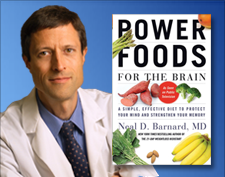
Dr. Barnard’s useful book focuses on three factors that affect memory: toxic metals in our diets, foods that protect the brain, and activities that protect the brain. Using the latest research, Barnard’s approach shows how minor adjustments can lead to big chances in memory and cognition. Other factors like genetics, the importance of fats, and the key vitamins that can protect us from dementia and Alzheimer’s are explored. If you’re as concerned about the aging brain as I am, I highly recommend Power Foods for the Brain.
TABLE OF CONTENTS
Chapter 1: Sharpen Your Memory, Enhance Your Brain
Chapter 2: Foods That Shield Your Brain From Toxic Medals
Chapter 3: Foods That Protect Your From Harmful Fats & Cholesterol
Chapter 4: Foods That Build Your Vitamin Shield
Chapter 5: Mental Exercises That Build Your Cognitive Reserve
Chapter 6: Physical Exercises That Protect Your Brain
Chapter 7: Build Memory Power as You Sleep
Chapter 8: Medicines & Health Conditions That Affect Memory
Chapter 9: A Brain-Enhancing Menu
Chapter 10: Conquer Food Cravings
Chapter 11: Menus & Recipes
I try to eat 10 servings of fruit and vegetable a day and almost no red meat. and very little carbs and sugar. I hope this sees me through. From what I have read lately, almost no food supplements helps at all. In fact, the only one one expert recommended was vitamin D.
Patti, you’re eating healthy. This book also focuses on toxic metals that may enter our diets (like aluminum and copper) and the role of exercise.
I’ve cut out several supplements in recent years too.
Jeff, after both my knee surgeries I ended up with low hemoglobin and was put on an iron supplement. Next time I meet with my internist I’m going to ask if I still need to take those iron tablets.
Yeah–I read somewhere that all those supplements do is give Americans very nutrient-rich urine! Like Patti, I try to eat plenty of fruits and vegetables (as one doctor put it, “Eat the rainbow does not mean Skittles”), along with plenty of beans (especially lentils–my favorite), with less emphasis on dairy and meat. I figure with 21 meals per week (breakfast, lunch, dinner–I never skip meals), at least 18 of them follow this plan, and even when I eat out or go to a party, etc., I try to be sensible about my choices. That and hope for the best!
Deb, your diet does sound sensible! The latest research shows that most vitamin supplements aren’t needed for most people. But up here in the Northern Climes we’re all low in Vitamin D (not enough sun).
I do take a multi-vitamin (I don;t think it can hurt) and C + D.
Jackie had low potassium for a while after her surgery and she doesn’t eat bananas. I brought her raisins and nuts to the rehab as well as salads, and they gave her pottasium supplements for a few days.
We eat a lot of fruit, and veggies and salads. Also make sure we get plenty of fiber.
Jeff, I had low potassium after my surgeries, too. They gave me a potassium shot each time and that fixed the problem. Fiber is very important!
I take a daily all-in-one vitamin, plus iron for my low red count and potassium supplement. All are M.D. prescribed/recommended. If I ate as much fruit as Patti, I’d be SEVERELY “loose”, I’m afraid. It was one of the reasons I had to drop the Palio diet (which wasn’t working anyway and had too much fat.
Rick, consider taking some B12, too.